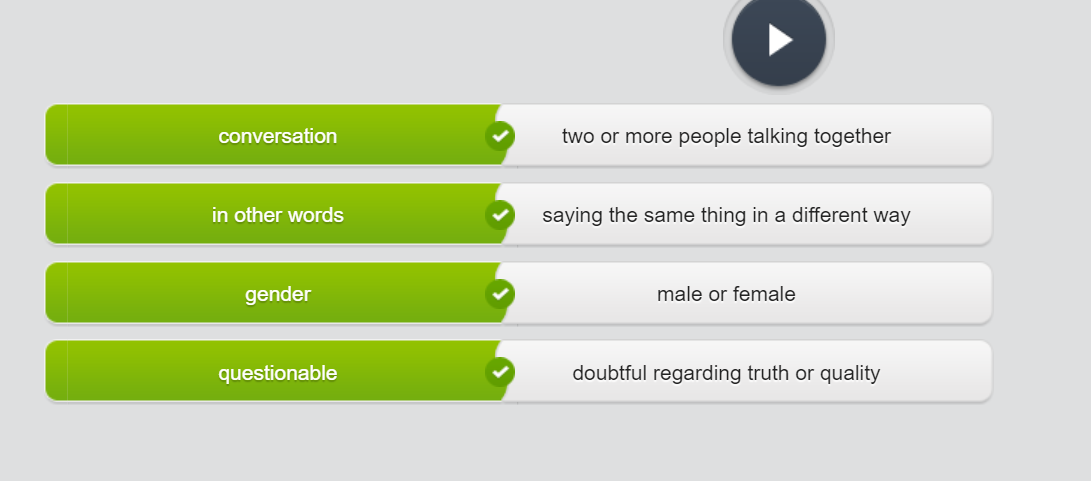L10U2-2-Speculating-about-change
1 Reading Differences in communication
Match the words and phrases to those with similar meaning.

Read the text and answer the questions.
striking 惊人的
Whereas 鉴于
perceived 感知
Gender Talk
by Lisa Goldstein
Do men and women communicate differently? Professor Deborah Tannen believes so. Research by the Georgetown University language expert suggests that there are striking differences between the way men communicate and the way women communicate.
Women use language to build and maintain better relationships, says Tannen. In other words, communication is a way for a woman to offer support to someone else. And it's a way for women to find agreement.
On the other hand, men use conversation to report information. Whereas women try to find agreement, men use language to become 'king of the conversation,' or to 'win the conversation.'
Tannen also found that, when it comes to communication, many people think that women talk too much. Yet Tannen says that real conversations show:
Women Men
may talk more in private may talk more in public
sometimes speak at the same time sometimes interrupt
get fewer public opportunities to talk get more public opportunities to talk
often offer understanding often offer advice
Of course, it's questionable to say all women and men always communicate in these ways. However, it may be helpful for people to know about these perceived gender differences. That way, men and women might be able to avoid some misunderstandings.
2 Vocabulary Describing change
New processes
Let's look at various ways to describe change in a company. Notice these phrases are often verb + noun structures. Here are some ways to describe new ideas or processes.
introduce a new mission statement
introduce a new mission statement
implement a new company structure
implement a new company structure
bring in new processes
bring in new processes
phase in new systems
phase in new systems
Changes to existing processes
Here are some ways to talk about changes made to existing processes. Notice the re- prefix, which suggests something done again.
revamp 改造
review and revise our policies
review and revise our policies 审查和修订我们的政策
restructure our teams restructure our teams
revamp our products revamp our products
Exaggerated claims 夸大的声明
Sometimes the person or group responsible for the changes will talk of them in exaggerated or hyperbolic terms.
Our new processes will transform the way we work. Our new processes will transform the way we work.
These new policies will completely change the way we do business.
Our new processes will transform the way we work. Our new processes will transform the way we work.
These new policies will completely change the way we do business.
revamping our mission statement 修改我们的使命宣言
Move the text to the correct gaps.
EMPLOYEE: Can you give us an indication of what kind of changes to expect?
CEO: Yes, just a little. One big change is that I'll be revamping our mission statement. I'll also be reviewing and revising our processes and policies, as well as introducing new business systems and bringing in a new management structure. I believe in working efficiently and delivering great products fast. I promise you: These changes will transform the way our company works.
Listen and record what you hear.
consultant 顾问
I'm bringing in a consultant to restructure our teams.
The company will review and revise its policies.
We will phase in new systems gradually.
She plans on implementing new processes.
We think a female CEO would transform the company.
We need to review and revise the mission statement.
mission 使命
3 Expressions Speculating 推测
What's possible?
You probably already know ways to use modals like could and might, or adverbs(副词) like maybe, to speculate about what's possible.
It could be new systems, or it might be new processes.
It could be new systems, or it might be new processes.
Maybe she's going to implement new policies.
Maybe she's going to implement new policies.
Now let's look at some other ways. You can wonder or ask speculative questions about what might happen.
I wonder what they're planning. I wonder what they're planning.
I wonder if they're restructuring the department. I wonder if they're restructuring the department.
What if they're bringing in new people?
What if they're bringing in new people?
You can use guess about the chances of something happening.
My guess is that it's a new office.
My guess is that it's a new office.
There's a chance it could be a new product.
There's a chance it could be a new product.
I'm guessing they'll bring in a new operating system. I'm guessing they'll bring in a new operating system.
Or, if you're fairly sure something will happen, you can use expressions like these:
I wouldn't be surprised if he implemented new policies. I wouldn't be surprised if he implemented new policies.
I imagine they're going to introduce new hardware. I imagine they're going to introduce new hardware.
Put the words in the correct order.
What if they bring in new managers?
My guess is he'll set up some new systems.
I wonder what they'll change about the product.
There's a chance they'll restructure the company.
I wonder if they'll revise the mission statement.
Listen and record what you hear.
There's a chance it could be a new product.
My guess is that it's a new office.
What if they're bringing in new people?
Maybe she's going to implement new policies.
I imagine they're going to introduce new hardware.
I wonder what they're planning.
Final Task Company update
Your colleague missed a meeting to introduce the new boss. Give him an update. Listen and record the correct response.
No, but the changes will transform our products.
不,但这些变化将改变我们的产品。
She's revising our mission statement.



